No tutu, no pointe shoes, no problem: In this Northeastern club, ballet is for everyone
Noreste Ballet Company welcomes dancers of all levels to rehearse, choreograph and perform in a full-scale classical ballet production each semester.
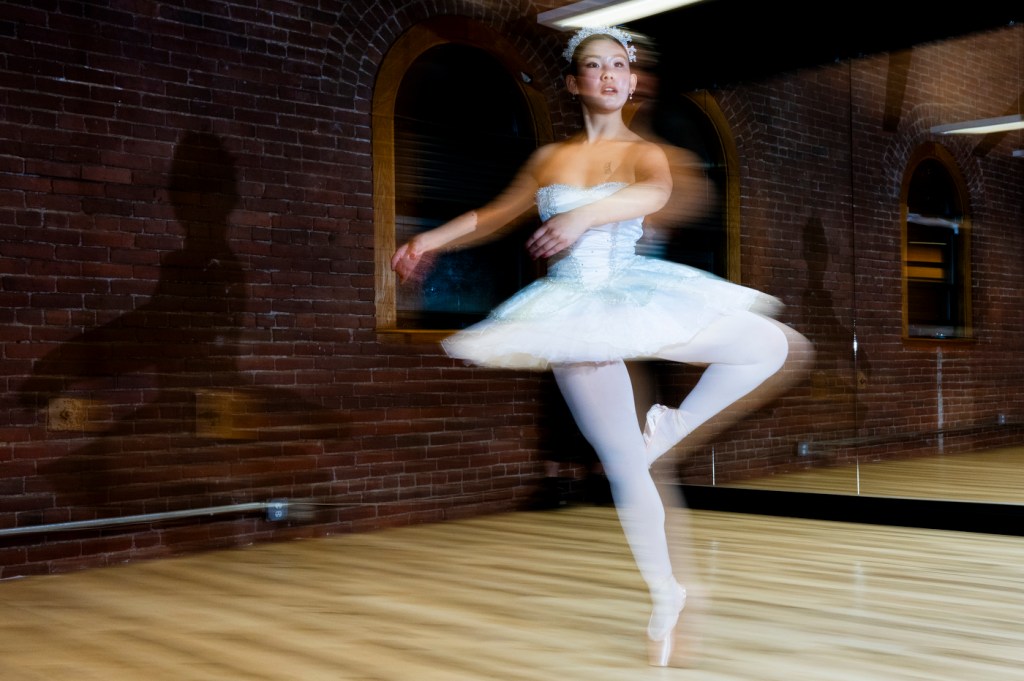
It still feels like summer in the small, slick-floored space at Boston Dance Studios, where members of the Noreste Ballet Company have assembled for their first dress rehearsal of the semester. The early October heat notwithstanding, however, it’s starting to look a lot like Christmas.
Bunched in a corner, a quartet of dancers stretch their ankles, tie up satin pointe shoes and pull matching pink-and-white tutus with gold trim over their leotards. In the center, Kate Bender, a bubbly second-year Northeastern psychology student, talks Melinda Lu and Gabriel Rodriguez through choreography for the pas-de-deux they’ll be dancing as Clara and the Nutcracker prince, respectively, in the campus club’s production of “The Nutcracker” on Nov. 8.
“You go ‘I was sleeping, and then I woke up,’” Bender shows Lu, putting her hands together at the side of her face and stretching her arms into an elegant “yawning” pantomime. She turns to Rodriguez. “This is the best part,” she giggles. “You go, ‘I … was a nutcracker!’” Bender jerks her head down, chomping widely with her jaw.
Afterward, Bender turns her attention to Jennifer Liu, a pre-med student dancing the difficult “Snow Queen” role. Liu’s elegance in her freshly-acquired costume — an ice blue tutu with a sparkling tiara — belies how hard she is working in the stuffy studio. She’s winded after completing her section, crossing the floor en pointe and taking up the entire space as she turns and leaps across the studio.
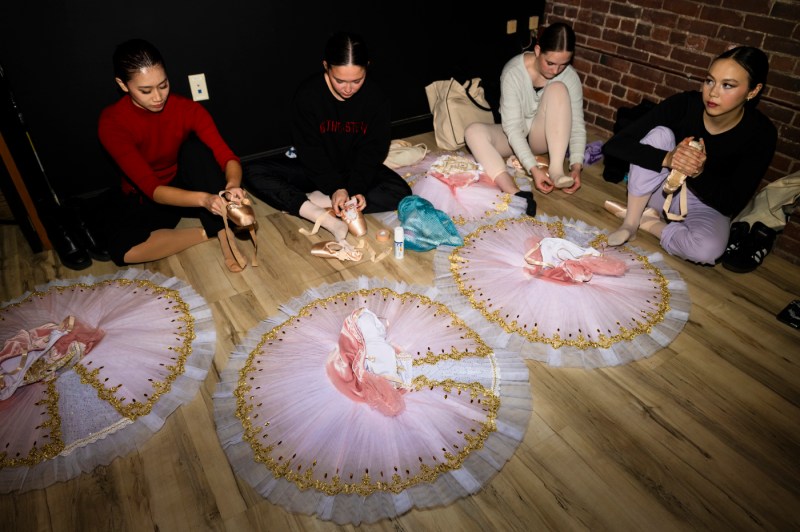
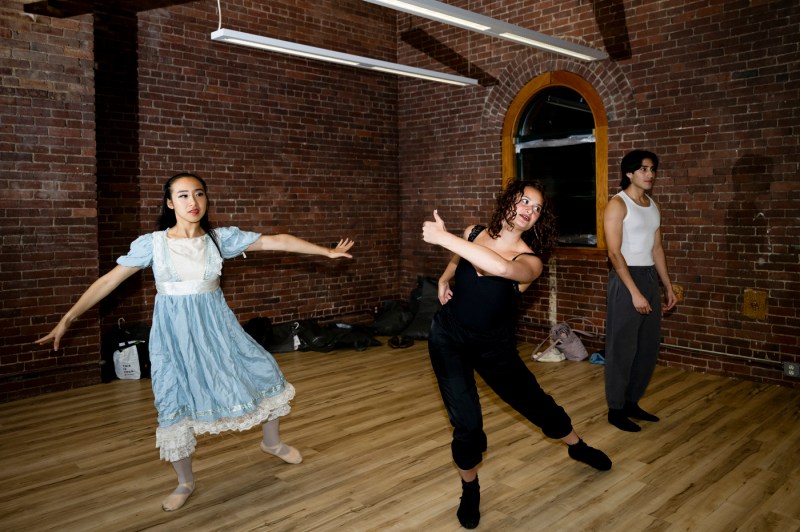
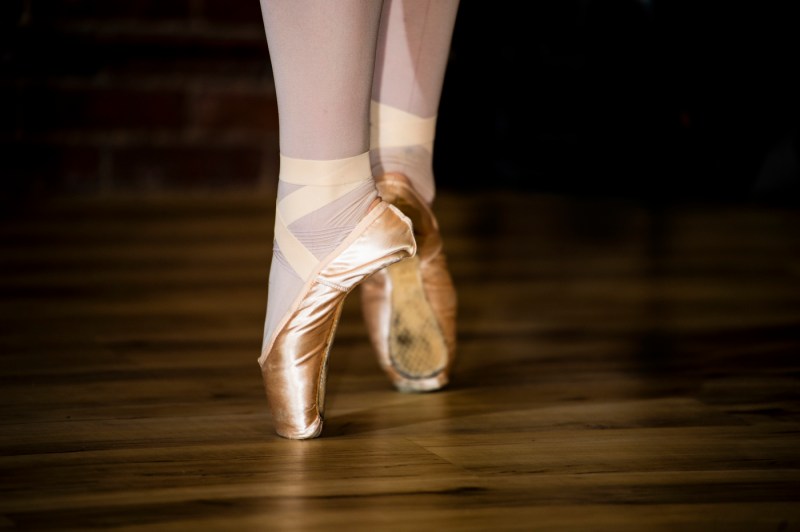
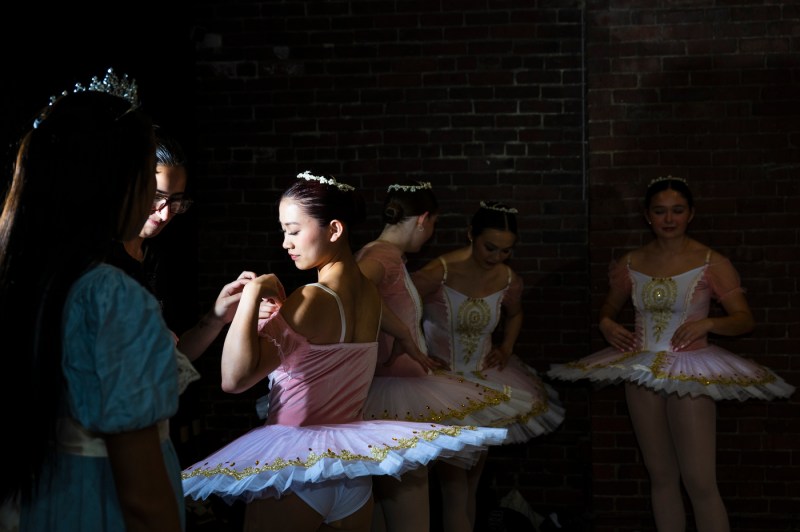
Some of the assembled dancers have been doing this since they were toddlers. Others — including Rodriguez, a second-year criminology major — just a few weeks. “I’ve done hip-hop before, but no ballet,” he tells Lu, his more experienced partner.
All of them will be performing in Tchaikovsky’s holiday classic in Blackman Auditorium on the Boston campus. This will be the group’s second mounting of the holiday staple and third production since becoming a fully recognized campus club in 2023. Last spring, they performed “Swan Lake.”
“I’m really excited for this production,” says Marina Ferreira, a third-year health sciences major and Noreste’s vice president. “That first ‘Nutcracker,’ we were just making sure that we could get it on onstage. Now that we’re established, we’ll be able to put on a higher-quality performance.”
The premise of Noreste Ballet Company is straightforward enough: Ballet should be open to everyone. Anyone can audition; everyone can perform. But because it’s ballet — an art form synonymous with all-consuming, punishing perfectionism — even that simple notion can be unfathomable.
“We take people with no dance experience at all,” says Natalie Coreas, a fourth-year criminology and criminal justice student and Noreste’s founder and president. “There’s no caveat. People don’t believe me when I say that, but genuinely: come as you are.”
That promise has helped the club enjoy brisk growth in its first few semesters. And there’s value in it, for both the novices and experienced ballet dancers in Noreste’s ranks. Somewhere around junior high, ballet starts to become an all-or-nothing proposition. Dancers hoping to go professional often attend dedicated conservatories through their teenage years; if they make it into a company, there isn’t time for college.
Those who don’t pursue dance professionally can take studio classes, but amateur opportunities to perform are elusive beyond high school.
“The idea came from that fork in the road,” Coreas says. “Either you decide to pursue a professional career, or you kind of let it fall off and it becomes just a hobby — if you have time to pursue it, and you have the money and space to do so.”
Most members of Noreste’s executive board have been dancing since they were very young. The club has allowed them to nurture and even grow their love for it around the demands of a college schedule — leading rehearsals, tackling solos that push them physically and artistically, and trying their hands at choreography.
“I have rediscovered my love for ballet,” says Emma Kriz, a third-year molecular biology major and Noreste’s treasurer. Kriz danced at an intense pre-professional studio in high school, encountering “slightly traumatizing” teachers, in her description.
“Being a part of this club can bring back people’s passion and enjoyment of this art,” she says. “It’s done so for me.”



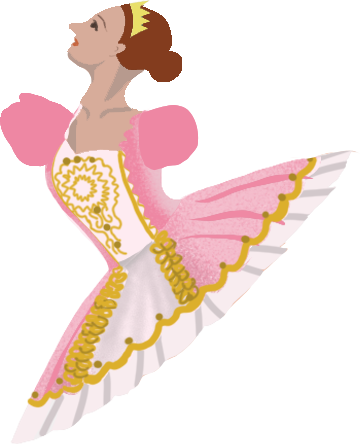

Ballet without barriers
The inspiration for Noreste came from Coreas’ childhood dance studio. Born and raised in Chelsea, Massachusetts, she danced with Melrose Youth Ballet. In addition to catering to a more diverse, lower-income population than a typical ballet studio, MYB puts on a “Nutcracker” production each year open to anyone who wants to participate.
“They took dancers from all studios in the North Shore area,” she says. “As long as you were enrolled in ballet class, you could be part of the production after you auditioned. There were no cuts.”
When Coreas came to Northeastern, that performance outlet was gone, and she found the drop-in ballet classes at the conservatories around campus intimidating despite her years of experience.
“I definitely felt some imposter syndrome,” she says. “Even though I knew it was for all levels, I just didn’t feel comfortable. So I figured, why not start something collegiate, and give people the room to learn and to grow in a supportive group, at a small cost?”
Coreas was mulling the idea over when she met Ferreira, whom she mentored through the University’s Latino Student Cultural Center. Growing up in Quincy, Massachusetts, Ferreira started dancing at age 2, studying ballet and contemporary at a studio without the resources to mount full productions.
“I loved it there, but it was kind of bare minimum,” she says. “We had one recital at the end of the year. I had never been able to do ‘The Nutcracker’ or anything like that before.”
Drop-in studio classes were out of reach financially, and Ferreira enrolled at Northeastern assuming she would never dance again. But Coreas’ idea thrilled her. They called the club “Noreste” as a nod to their shared Latina heritage and to the group’s overarching goal of diversity on all possible fronts. The club’s motto is “a classical ballet company without barriers.”
Those barriers include background (despite progress, professional ballet remains overwhelmingly white), skill, income and even time. Member dues are $20 for the whole semester, and students with other extracurriculars or time-consuming degree tracks can commit to the club for as little as one hour per week.
“We like to allow people to do what they want, on their own schedule,” Coreas says. “That’s something not a lot of other clubs will do, and I think it’s helped us grow.”
At its inception, Noreste only offered studio classes that attracted between 5 and 10 students. But word spread, and by fall 2023 the group had grown to about 25 members and pulled together enough funding to mount its first show, held at the Fenway Center near campus.
Melrose Youth Ballet donated Nutcracker costumes, and members’ family and friends pitched in where they could. Kriz danced the titular role, and her mother sewed extra costume pieces.
“I was the Rat Queen, and we were struggling to find good rat costuming,” says Alyssa Ybarra, a third-year computer science and game design major. “Emma’s mom just came out with these great little rat heads that looked insane. They were so well made, and that got us all really excited.”



Putting on a show
For Noreste’s leaders, juggling the needs of the group’s multifaceted, rapidly growing membership takes a ton of effort. This past September, 50 dancers came to auditions, where they filled out a form indicating their dance experience, costume measurements and desired level of commitment. “Low” is one to two hours per week; at the higher end, solo dancers put in closer to six or eight.
The audition includes ballet basics — a section at the barre, a pass across the floor, and movement combinations in the center. From there, the group’s scheduling coordinators assign solos and sort dancers into specific group numbers within the performance piece, balancing availability and skill level. It makes for an intricate Excel spreadsheet.
“We make it harder for ourselves to make it more accommodating to our dancers,” Coreas says.
In group rehearsals, Noreste’s more experienced leadership mixes with the novices, leading sections and pitching in on choreography, if they’re interested.
“It’s a way to explore different areas,” says Ana Antic, Noreste’s secretary. A third-year biochemistry and data science major, Antic danced in the Nashville Ballet’s pre-professional youth program. At Noreste, she handles music and lighting for the shows and has been taking on choreography for the fall production. “I’ve never had the opportunity to do choreography, and it’s something I’ve always wanted to do.”
Antic says the numbers are optimized to give everyone a chance to shine. Some dances have mixed skill levels, while others give novices dedicated turns in the spotlight. At the October rehearsal, she leads a group of dancers with a range of experience through the Nutcracker’s boisterous “Russian Dance” — the more seasoned in the group executing difficult chaînes while the novices do-si-do in formation.
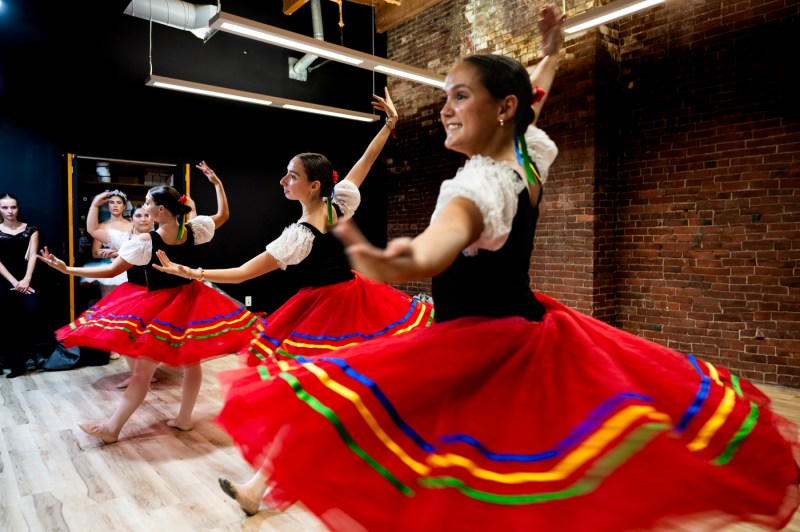
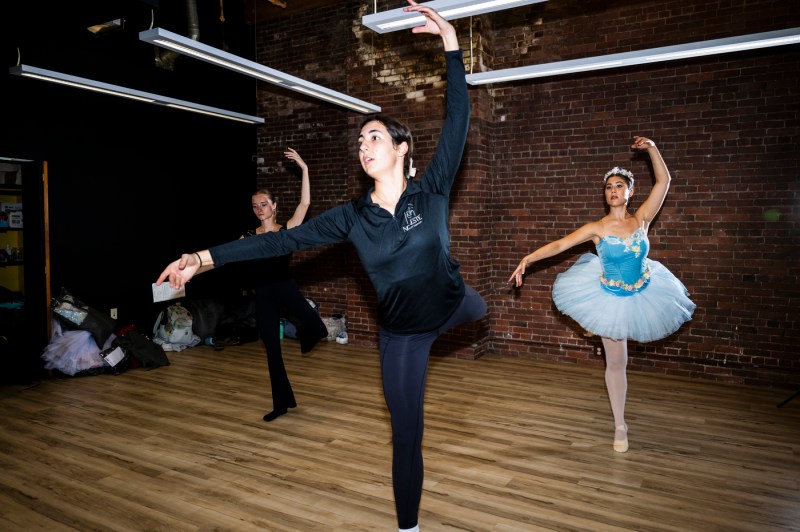
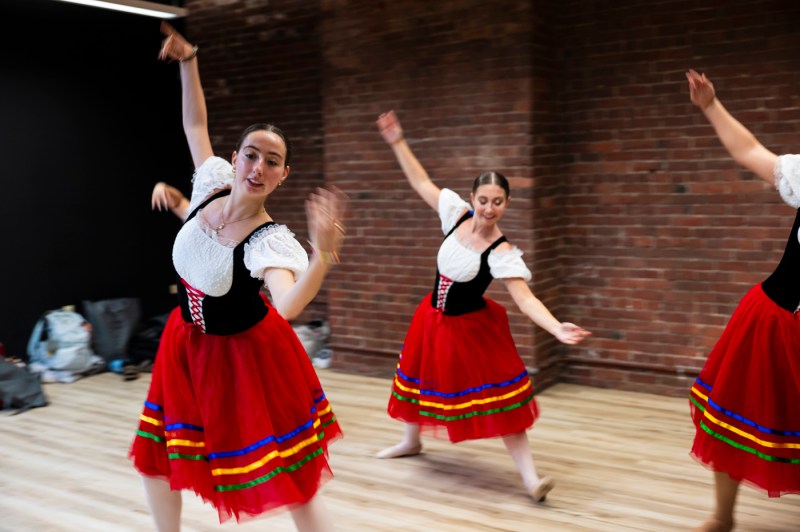
“I definitely wasn’t as good as the other people,” says Nicole Buckley, a 2024 graduate who joined Noreste last year. “I’m super inflexible — cannot touch my toes, cannot do the splits. But I still got a lot of stage time.’’
Buckley, who studied computer science at Northeastern, was so unfamiliar with ballet that at her first rehearsal that she couldn’t even understand the basic instructions: plié, attitude, tendu.
“They’d be like, ‘do [word in French]. And I’d be like, ‘I don’t know what [word in French] is! Explain it to me!’’’ she laughs. “But they were really good at giving feedback without making you feel bad for not knowing what was going on.”
The dances challenged her physically — choreographers try to push dancers at every level with material that will make them better. But for Buckley, the thrill of performing was the real revelation. “That was really fun, and dressing up in the costumes,” she says. “I wasn’t in any performance arts when I was younger, and now I wish I’d gotten to do more of it.”



“This is your opportunity”
To its members, that thrill of discovery — of trying something that seemed out of reach, or that it was too late to try — is fundamentally what Noreste is about.
“Growing up, I had always had friends say, ‘It’s so cool that you dance, I always wanted to do it,’” Antic says. “But once you get to a certain age, it’s really hard to dip your toes in the water because it feels like everyone else has so much more experience. So for beginners, I try to pitch that if you’ve always wanted to, this is your perfect opportunity. There’s no pressure.”
Back at Boston Dance Studios, that lack of pressure doesn’t undermine the effort the dancers are putting in. As the group in pink and white tutus dance the “Marzipan” number, Bender reminds them to create space in their arms, “like you’re holding a flute.” After a few run-throughs of the en pointe choreography, they look like they’ve run a 10K.
Lu and Rodriguez run through their section as Clara and the Nutcracker again; they have an innocent, winning chemistry together, and Bender is thrilled with the results. “That was SO good you guys!” She gushes. “It’s believable and not creepy!”
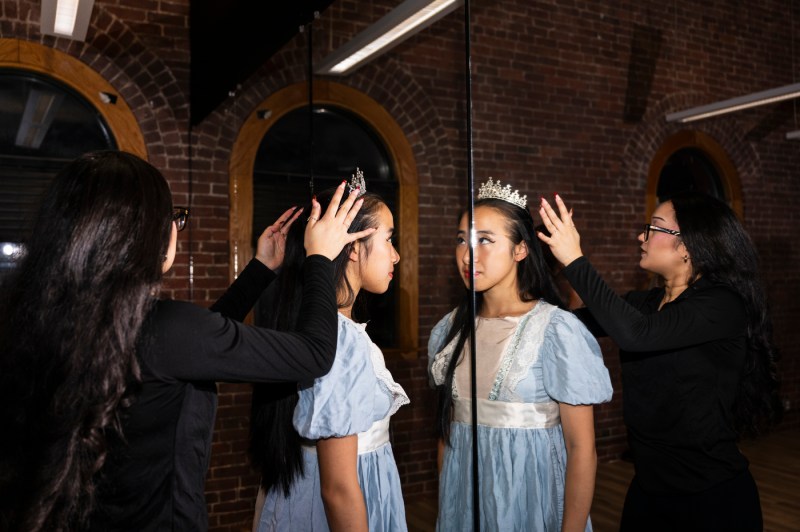
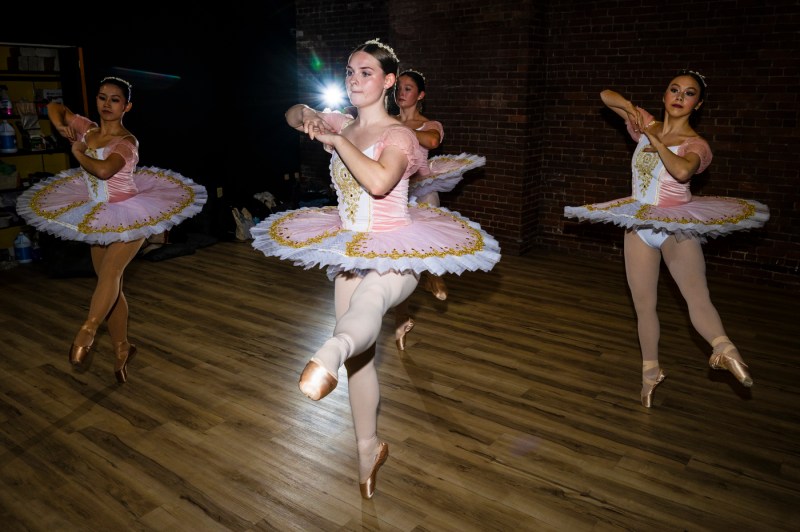
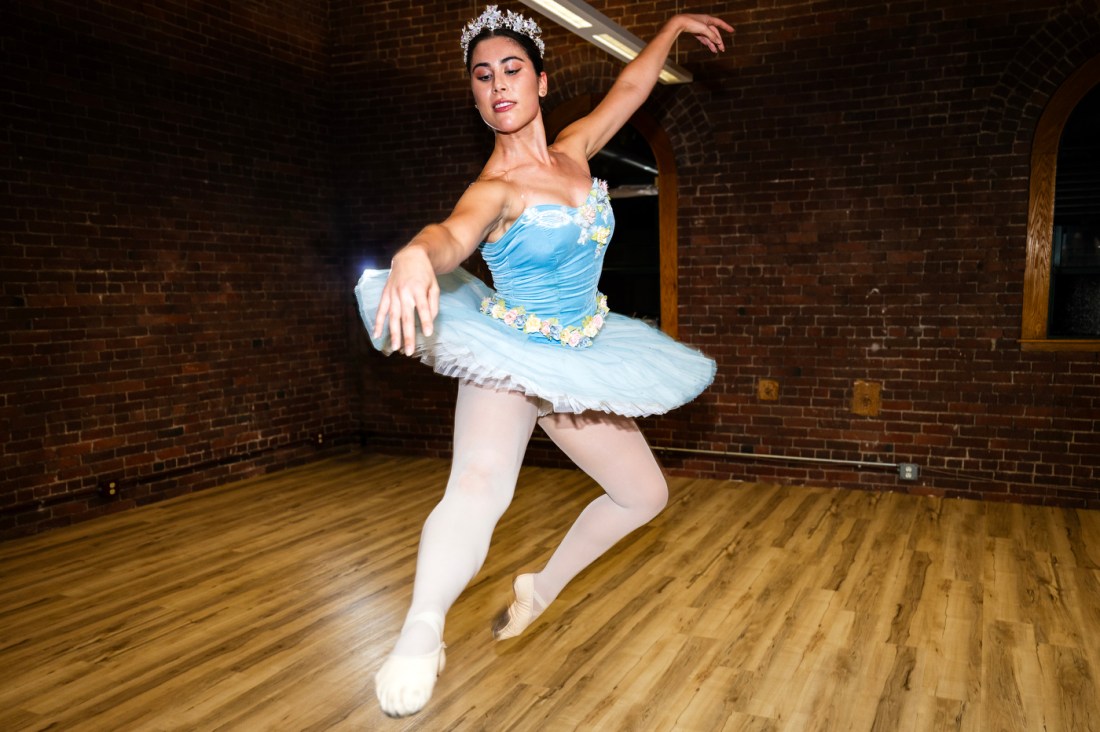
Coreas is busy throughout — hauling costumes, directing traffic in and out of the small space, adjusting headpieces and giving feedback on the performances — feet straight; remember to smile.
It’s Coreas’ last year at Northeastern. Noreste has been a deeply personal labor of love, and she thinks a lot about the club’s future after she graduates. “I will be stalking the company once I leave,” she says. “And I hope to come back to see it standing on its own two feet.”
She thinks that because of the breadth of what Noreste offers its members, the club is fundamentally strong enough to persist for years to come. “I’ve been part of other clubs that have kind of fallen off after a majority of the executive board graduates, and I don’t think we’re at risk of that,” she says. “It’s so important that classical ballet be something that everybody has access to.”

Tickets are available to Noreste’s Nov. 8 performance of “The Nutcracker” here.







